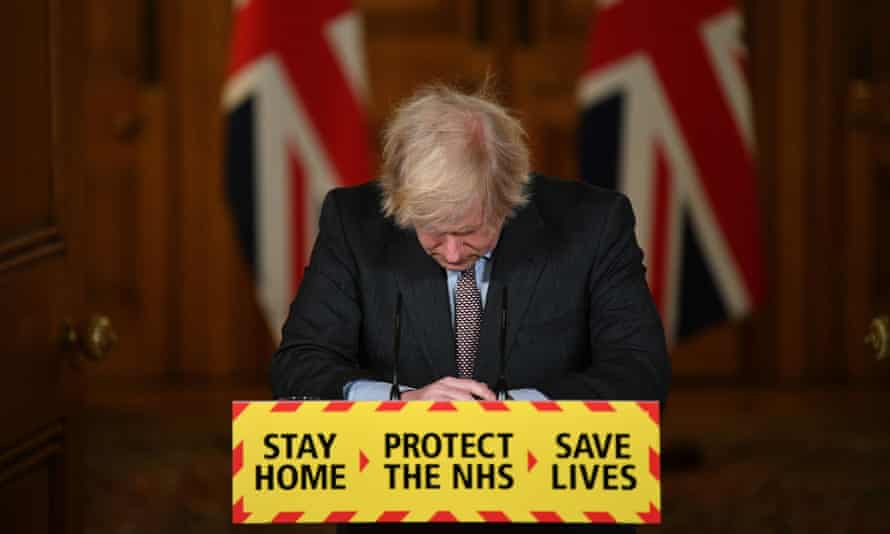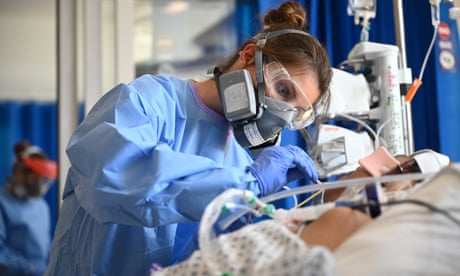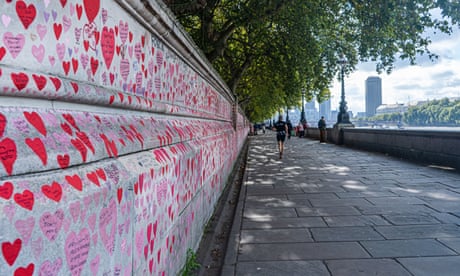Analysis: inquiry into UK’s response to Covid crisis shows Sage guidance should be put in public domain as soon as possible

While releases of Sage documents have become regular, even in 2021 some documents have been published six weeks or more after being considered by Sage.
Photograph: Justin Tallis/PA
Nicola Davis Science correspondent
@NicolaKSDavis
Tue 12 Oct 2021
The parliamentary inquiry into the UK’s response to the Covid crisis raises the serious issue of transparency around scientific advice – and why this remains crucial even as the country moves beyond an emergency situation.
The 151-page Coronavirus: lessons learned to date report, led by two former Conservative ministers, has made it clear that advice from the Scientific Advisory Group for Emergencies (Sage) should be rapidly placed in the public domain.

Covid response ‘one of UK’s worst ever public health failures’
“In a pandemic, the scientific advice from the Sage co-chairs to the government should be published within 24 hours of it being given, or the policy being decided, whichever is the later, to ensure the opportunity for rapid scientific challenge and guard against the risk of ‘groupthink’. In addition, minutes and Sage papers should be published within 48 hours of the meeting taking place.”
Advertisement
Compare this recommendation with the reality of what actually happened.
It took until late May last year, months after the crisis began, for the first minutes and advice from Sage to be publicly released.
As a report from the Institute for Government, published in December, noted, this created a climate of “suspicion about the government’s approach that it has struggled to shake off, even after much greater publication and openness”.
While releases of Sage documents have become regular, even in 2021 some documents have been published six weeks or more after being considered by Sage.
Criticisms have been made about the time it took to release the scientific advice given to ministers in September 2020 and ahead of Christmas last year.
The situation now is more complex than then.
According to the Government Office for Science, Sage continues to meet as needed but “at a reducing tempo” because there is less demand for advice. .
The Guardian understands that meetings of the New and Emerging Respiratory Virus Threats Advisory Group (Nervtag) have also become less frequent.
Activity also appears to have reduced in Sage’s behavioural science subgroup, Spi-B, with participants told in June there would no longer be regular meetings due to an expansion of in-house expertise.
But Sage and its subcommittees have not been, and are still not, the only sources of advice or insight for ministers. Other sources include the Joint Committee on Vaccination and Immunisation (JCVI)and the government’s chief scientific adviser, while the government set up the Joint Biosecurity Centre (JBC) in May last year which “provides evidence-based, objective analysis to inform local and national decision-making in response to Covid-19 outbreaks.”

Bereaved families call for acceleration of UK Covid inquiry after MPs’ report
The UK Health Security Agency (UKHSA) was launched this month – a government agency formed from a merger of Public Health England (PHE). This will provide crucial insights into the spread of Covid variants, NHS test and trace, and the JBC.
The Guardian understands that the UKHSA, being a government body, will not be releasing minutes of every meeting. However, it stressed that it was committed to transparency, and has released a plethora of data and research.
So, questions remain around who provides the main sources of scientific advice for ministers, how much of this is independent, and how much of it should be shared with the public.
Tom Sasse, an associate director at the Institute for Government, said the main channel of scientific advice to the prime minister on Covid would be from the government’s chief scientific adviser – Sir Patrick Vallance – and chief medical officer for England – Prof Chris Whitty – supported by their respective departments.
“But this is not public and minutes/docs remain private,” Sasse said, adding that “even during the peak of the crisis they would still have been providing much advice we could not see outside of Sage process”.
What is clear is that with the pandemic far from over, transparency will remain crucial if mistakes of the past are not to be repeated.
Nicola Davis Science correspondent
@NicolaKSDavis
Tue 12 Oct 2021
The parliamentary inquiry into the UK’s response to the Covid crisis raises the serious issue of transparency around scientific advice – and why this remains crucial even as the country moves beyond an emergency situation.
The 151-page Coronavirus: lessons learned to date report, led by two former Conservative ministers, has made it clear that advice from the Scientific Advisory Group for Emergencies (Sage) should be rapidly placed in the public domain.

Covid response ‘one of UK’s worst ever public health failures’
“In a pandemic, the scientific advice from the Sage co-chairs to the government should be published within 24 hours of it being given, or the policy being decided, whichever is the later, to ensure the opportunity for rapid scientific challenge and guard against the risk of ‘groupthink’. In addition, minutes and Sage papers should be published within 48 hours of the meeting taking place.”
Advertisement
Compare this recommendation with the reality of what actually happened.
It took until late May last year, months after the crisis began, for the first minutes and advice from Sage to be publicly released.
As a report from the Institute for Government, published in December, noted, this created a climate of “suspicion about the government’s approach that it has struggled to shake off, even after much greater publication and openness”.
While releases of Sage documents have become regular, even in 2021 some documents have been published six weeks or more after being considered by Sage.
Criticisms have been made about the time it took to release the scientific advice given to ministers in September 2020 and ahead of Christmas last year.
The situation now is more complex than then.
According to the Government Office for Science, Sage continues to meet as needed but “at a reducing tempo” because there is less demand for advice. .
The Guardian understands that meetings of the New and Emerging Respiratory Virus Threats Advisory Group (Nervtag) have also become less frequent.
Activity also appears to have reduced in Sage’s behavioural science subgroup, Spi-B, with participants told in June there would no longer be regular meetings due to an expansion of in-house expertise.
But Sage and its subcommittees have not been, and are still not, the only sources of advice or insight for ministers. Other sources include the Joint Committee on Vaccination and Immunisation (JCVI)and the government’s chief scientific adviser, while the government set up the Joint Biosecurity Centre (JBC) in May last year which “provides evidence-based, objective analysis to inform local and national decision-making in response to Covid-19 outbreaks.”

Bereaved families call for acceleration of UK Covid inquiry after MPs’ report
The UK Health Security Agency (UKHSA) was launched this month – a government agency formed from a merger of Public Health England (PHE). This will provide crucial insights into the spread of Covid variants, NHS test and trace, and the JBC.
The Guardian understands that the UKHSA, being a government body, will not be releasing minutes of every meeting. However, it stressed that it was committed to transparency, and has released a plethora of data and research.
So, questions remain around who provides the main sources of scientific advice for ministers, how much of this is independent, and how much of it should be shared with the public.
Tom Sasse, an associate director at the Institute for Government, said the main channel of scientific advice to the prime minister on Covid would be from the government’s chief scientific adviser – Sir Patrick Vallance – and chief medical officer for England – Prof Chris Whitty – supported by their respective departments.
“But this is not public and minutes/docs remain private,” Sasse said, adding that “even during the peak of the crisis they would still have been providing much advice we could not see outside of Sage process”.
What is clear is that with the pandemic far from over, transparency will remain crucial if mistakes of the past are not to be repeated.
No comments:
Post a Comment